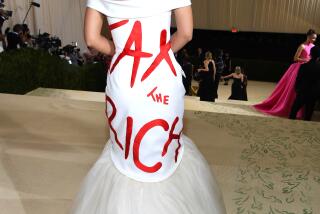Highly Compensated, but Highly Restricted in Funding Your 401(k)
- Share via
Q. In 1998 my salary was $80,000, and I contributed 9.5% of it to my 401(k) plan at work. I got a $4,000 raise in January, of which I take home a whopping $120 a month after taxes. But because of the raise, the IRS says I’m now classified as a “highly compensated” person and can only contribute a maximum of about 7.2% a year to the 401(k)! So, because of this minor raise, I’ve had to reduce my 401(k) contributions. Do you know any way around this?
*
A. Ah, welcome to the world of the highly compensated employee, where your 401(k) contributions are held hostage by your lower-paid co-workers.
Here’s the scoop. Once you make more than $80,000 a year, your 401(k) contributions are generally limited to 2 percentage points more than the average contribution made by all eligible employees at your company who make less than $80,000. So if the contributions by lower-paid workers averaged 5.2% of their pay last year, you can’t give more than 7.2% this year.
These seemingly arbitrary rules are actually designed to make sure that company bigwigs don’t use their 401(k) plans as a personal perk. The rules give employers a strong incentive to educate all their employees about the plan and encourage everyone to contribute.
In fact, you might urge your employer to boost its 401(k) outreach and education, because that is the way you are most likely to be able to increase your contribution. It won’t help you this year, but it might next year.
There are other ways around the limitation, but your employer may not go for them. That’s because they require employers to structure their programs in particularly generous ways, either with a high match or by making a contribution for every employee, regardless of whether the employee put his or her own money into the plan.
If your company did either, you and your better-paid peers could contribute up to the overall IRS maximum--$10,000 a year--without worrying about the rules on highly compensated employees. Not too many companies are willing to go to that expense, although you can always ask yours to consider it.
Finally, don’t let your 401(k) limit how much you save for retirement. You can put $2,000 into a Roth IRA, and you may even be better off, as my colleague Paul Lim points out in the adjacent column. You can also save outside of any retirement accounts. A tax-efficient mutual fund, such as a fund that mimics the Standard & Poor’s 500 index, would allow you to continue putting away money outside your retirement fund while minimizing the tax bill.
Lifestyles of the Rich and Clueless
Q. A few weeks ago, you answered a question from a couple who had an $800,000 windfall and who said they were not rich. You said they were. I disagree. Truman Capote once mused that one who has an income of $5 million a year, sans taxes, is truly rich, and he was right. I have a lot of clothes, new car, dine out when I choose, buy books and enjoy foreign travel, but I am not rich.
*
A. Oh, yes you are, my dear. Yes, you are.
I take it your foreign travel is limited to the better hotels of Europe, because if you poked your nose outside of the developed world once in a while you would see that your standard of living is considered beyond the wildest dreams of the vast majority of the world’s population.
You’re comparing yourself to Michael Jordan and Bill Gates, while the typical human is worried about keeping food on the table and a roof overhead. Talk to the average person in India, and you’ll find that the fact you even own a car is stunning.
Chat with a Chinese national and be reminded that the amount of room you claim as your personal space--and it could be just a one-bedroom apartment--is considered luxurious. Even among we spoiled Americans, you are doing quite well.
The median household income in this country is about $37,000--which means half of U.S. households make less than that amount. More than 35 million people live below the poverty line in the U.S., and I don’t think they would find your cluelessness about what constitutes being rich all that amusing. Rich is living well and having choices, and that’s definitely you.
Liz Pulliam is a personal finance writer for The Times and a graduate of the certified financial planner training program at UC Irvine. She will answer questions submitted--or inspired--by readers on a variety of financial issues in this column. She regrets that she cannot respond personally to queries. Questions can be sent to her at liz.pulliam@latimes.com or mailed to her in care of Money Talk, Business Section, Los Angeles Times, Times Mirror Square, Los Angeles, CA 90053. For past Money Talk questions and answers, visit The Times’ Web site at https://www.latimes.com/moneytalk.
More to Read
Inside the business of entertainment
The Wide Shot brings you news, analysis and insights on everything from streaming wars to production — and what it all means for the future.
You may occasionally receive promotional content from the Los Angeles Times.










